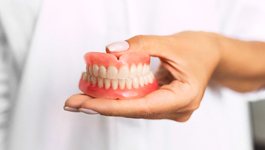Dentures Wakefield
Completely Restore Your Smile
Losing many or all the teeth in your upper or lower jaw can be devastating. You won’t be able to eat normally anymore, and it’ll be much harder to smile with confidence. For these cases, Schumacher Dental can use different kinds of dentures in Wakefield that’ll let you perform all the day-to-day tasks that you’d normally rely on your natural teeth for. Looking to restore your smile or the smile of a loved one? Contact us for an appointment today.
What Are Dentures?

Dentures are also called “false teeth.” They’re probably one of the most well-known kinds of dental restorations; they’re the solution for 90% of patients with tooth loss. In most cases, dentures will have a gum colored acrylic base that supports plastic or porcelain teeth. The base and the teeth can be customized so that they’ll look as natural as possible in the patient’s mouth. Metal can also be used to reinforce the structure of the dentures.
Depending on the number of healthy teeth left in the jaw, you may need to have a few tooth extractions done before you can receive a set of dentures.
Who’s a Good Candidate for Dentures?

Are you missing teeth and longing for a complete smile? Look no further than dentures, a versatile tooth replacement option available to almost anyone! To find out if this option is right for you, you will need to schedule a consultation with Dr. Schumacher. Even if you're currently not a viable candidate, there may be options to enhance your candidacy by restoring the health of your gum tissue and bone structure. Take the first step towards a confident smile by exploring the possibilities of dentures with our team today!
Effects of Missing Teeth

According to the American College of Prosthodontists, tooth loss can be attributed to various factors, including tooth decay, gum disease, and dental injuries. Should you experience any of these issues, you need to address them right away. Otherwise, the consequences of not replacing missing teeth extend beyond oral health.
Facial sagging, speech difficulties, challenges with eating, and decreased self-esteem are just a few consequences that can arise from missing teeth. By getting dentures, you can minimize the risk of these complications and improve both oral function and confidence.
What Qualifies You for Dentures?

Dentures are an excellent solution for individuals who have experienced significant tooth loss, suffer from tooth sensitivity, or have extensive tooth decay. To be a suitable candidate for dentures, you must have sufficient healthy gum tissue and jawbone. You also need to commit to maintaining proper dental hygiene and caring for both the dentures and your overall health. Furthermore, dentures present an affordable tooth-replacement option, making them an attractive choice for patients on a budget.
Alternative Tooth-Replacement Options

Not a good candidate for dentures? That’s okay! You can explore our other tooth replacement options, which include:
- Dental Bridges: These are ideal for patients with a few missing teeth. It’s worth noting that they rely on healthy teeth adjacent to the gap to support the prosthetic tooth.
- Dental Implants: This option requires a strong bone structure and offers a permanent solution. While implants may be more expensive than traditional dentures, they provide long-lasting results.
Your Options for Dentures

Are you missing all of your teeth or just a few? Can your jaw support dental implants, or will you need to rely on more traditional options? Depending on the answers to these questions, you could get a few different kinds of dental implants.
Partial Dentures
These are used when there are a few gaps in your mouth while you still have plenty of healthy teeth that are worth saving. Partial dentures can be customized depending on where tooth loss has taken place. In most cases, they’re held in place by a metal clasp.
Full Dentures
The most traditional kind of false teeth, full dentures are used when an entire arch is gone. They rest directly on the gums and are held in place by natural suction; however, you can use a denture adhesive to give them added stability for speaking and chewing.
Implant Dentures
Full dentures can be supported by dental implants, which are metal posts that fuse with the jawbone. With implants, you’ll no longer have to worry about your dentures slipping out of place. You’ll also be able to enjoy almost any kind of food thanks to the chewing power that implants provide.
How Dentures Are Made

Dentures are customized just for you, but what exactly does the process consist of? Understanding the process will help you to appreciate your new smile even more! Continue reading to learn more about how we can achieve the final results of your one-of-a-kind restoration.
What Are Dentures Made Of?

Dentures are comprised of two different parts – the base and the replacement teeth. Here is what they include:
- Dentures Base: This is the foundation that gives artificial teeth support. It can be made from many different materials, including acrylic, nylon, and resin. Full dentures are usually made using acrylic because they can be tailored to closely match your gum tissue. Partial dentures sometimes use metal clips with an acrylic base.
- Artificial Teeth: The replacement teeth are attached to the base. They are usually made from resin or porcelain because they both have a natural appearance. However, porcelain is a more popular option because it appears and feels like natural teeth. It is also a durable material.
The Denture Creation Process

Every denture is customized for the patient’s mouth. This requires a multi-step process. Here is what a step-by-step process typically looks like:
- Step 1: First, your dentist will start by taking impressions of your upper and lower gums using a thick paste. This is used to create a plaster model that acts as a replica of your mouth. The model is used to make sure the final denture is of the appropriate size and shape. Measurements of your jaw may be taken at this time.
- Step 2: Next, the case is sent to the dental laboratory where your dentures will be crafted. They will create a wax replica of your gum line.
- Step 3: The artificial teeth are set into place, and a mechanical device known as an articulator will be used to attach the teeth with wax/ The technician will make minor adjustments by shaping and carving the wax to ensure that it looks like your gums. This wax base will be used for your finished denture.
- Step 4: The wax dentures are sent to your dentist for a fitting. If everything looks good, the dentures are sent back to the dental lab where the process will be completed. Until then, you will be given temporary dentures to wear.
- Step 5: Once they have been returned to the lab, the technician will boil your dentures to get rid of the wax portions. To do this, the dentures are placed in a flask which is a holding device into which plaster is poured to maintain the shape of the dentures. The entire flask is placed in hot water to melt the wax away.
- Step 6: Once the wax is melted away, holes are made in the teeth so the material can attach to it. A liquid separator is added to the plaster layer to stop the acrylic from sticking to it. Acrylic is injected into the flask to replace the wax.
- Step 7: The plaster is carefully removed using special lab tools to reveal the dentures. The dentures are placed into an ultrasonic bath to remove any remaining plaster.
- Step 8: Any excess acrylic will be cut from the denture. After the trimming process, the denture will be polished.
- Step 9: Once the process is complete, you can return to the practice for a fitting. Adjustments will be made if needed to ensure everything is working properly and smoothly.
Adjusting to Your New Dentures

It’s normal to experience slight discomfort when you first get your new dentures. The good news is that this is completely temporary. With a little bit of time, your mouth will adjust to dentures, and they will feel very similar to natural teeth. During the adjustment period, it’s a good idea to stick to softer foods and to exercise your facial muscles. If the discomfort persists, give us a call so we can help!
Benefits of Dentures

Dentures have long been a reliable solution for patients missing some or all of their teeth. At Schumacher Dental, our custom-made dental prosthetics not only restore the appearance of your smile but also enhance the functionality of your mouth. In fact, dentures offer a range of benefits that can greatly enhance your quality of life. If you’re curious about how our high-quality dentures can work for you, read more below! If you want to see if dentures are right for you, call us today to schedule your consultation.
Psychological Benefits

Living without teeth or with damaged teeth can often bring down your self-esteem and confidence. Many patients often refuse to smile or engage in social activities because of the appearance of their teeth which only makes things worse! This lack of self-care and social isolation can spiral into unwanted and unhelpful feelings.
Dentures provide a fantastic tooth replacement solution that helps restore your smile, making you feel more comfortable, confident, and ready to engage again! By improving your appearance, dentures can enhance your overall mood and mental health, often dispelling the anxiety and depression often associated with tooth loss.
Clearer Enunciation

Missing teeth can cause speech problems, including slurring, mumbling, and whistling, making it difficult to pronounce certain words and sounds. Dentures can be a lifesaver in this regard, filling the gaps in your mouth and allowing you to speak more clearly and confidently. With dentures, you'll find it easier to articulate words, which is all but necessary for effective communication. This improvement in your speech quality can be particularly beneficial in professional settings or social interactions where clear speech is important.
Improves Nutrition

Having a complete set of teeth is important for proper chewing and smoother digestion. In this way, dentures enable you to enjoy a wider variety of foods like fruits, vegetables, and lean meats. These foods contain vitamins and minerals that are vital to your overall health, especially as you get older. With the ability to chew food properly, you can not only continue to stay nourished, but also keep your stomach happy by properly processing your food.
Preserves Oral Health

Dentures are vital in preserving your oral health! Firstly, they prevent remaining natural teeth from shifting out of place, which can lead to bite problems and jaw issues. They also support the structures of your mouth, holding the shape of your face and preventing the sunken appearance that often accompanies tooth loss. By filling in the gaps left by missing teeth, dentures also minimize the risk of plaque buildup and associated dental problems, contributing to better oral hygiene and long-term dental health.
Expands Opportunity

A beautiful smile can leave a lasting impression and open doors to new opportunities! With dentures, you can achieve a more attractive and confident smile, which can positively affect your personal and professional life. Whether you’re doing a job interview, meeting new people, or advancing in your career, a winning smile can enhance your appearance and create a positive impression. Dentures can help you feel more self-assured, increasing your chances of success in many areas of life.
Understanding the Cost of Dentures

Dentures hold the distinction of being one of the most cost-efficient methods of replacing a lot of teeth at once. However, as with any major procedure, patients are often pretty nervous about how they’re going to pay for their care.
We do everything that we can to make the care that you receive as affordable as possible, and we have options available that can make your prosthetic fit your budget. Until we can give you a detailed estimate for the cost of your care when we meet you in person, here’s what you should know about the price of dentures.
Factors that Affect the Cost of Dentures

Dentures aren’t a one-size-fits-all solution—they’ll be personalized to fit you. That being the case, the cost of your prosthetic can depend slightly based on your needs. First of all, the overall cost of getting your dentures will be impacted by whether you need to have teeth extracted or gum disease treatment. If you need these preliminary procedures before you get your prosthetic, you should factor that into your overall budget.
Then there’s the material used of the prosthetic itself. The type of acrylic used for the base of your prosthetic and the style of replacement teeth that you use will all affect the overall cost of your dentures. We’ll walk you through the options available to you when we meet you in person.
Are Implant Dentures More Expensive?

Implant dentures generally cost more upfront than their traditional counterparts. As you can imagine, the cost of the surgery and the materials used for the implants themselves will impact what you pay overall for your prosthetic.
However, implant dentures also last considerably longer, and there’s never any need to reline them. For that reason, paying for this procedure upfront will save you a fair amount of money in the long run.
Does Dental Insurance Cover Dentures?

Dental insurance will usually cover dentures, typically paying for around 50% of the total cost of your procedure. This is because dentures are an important medical procedure that offers substantial health benefits to patients who are missing teeth.
However, details will obvious vary based on the particulars of your dental plan, so we’ll be sure to help you consult with your insurance plan when we meet.
Other Options for Making Dentures Affordable

We also want our coverage to be affordable for patients that don’t have insurance, which is why we offer a variety of options that can help your dentures fit your budget. For one, we have an in-house membership plan through Kleer that can offer you substantial discounts on the care that we provide you.
You may also be interested in CareCredit, a firm that offers low-to-no interest financing options to patients who qualify based on a credit check. If you have any questions about how you can make this care for affordable, feel free to reach out to us for a consultation today!
Dentures FAQs

Here at Schumacher Dental, you can count on us for dentures in Wakefield. That said, you may still have questions about them. Such concern is only natural — who wouldn’t want to learn about their new restorations? Given that fact, then, our team has listed the answers to frequently asked denture questions below. Please read them over, as they’ll give you an idea of what to expect from treatment.
If you don’t find the exact facts you want, don’t worry; feel free to call our office and ask for more details!
What Qualifies You for Dentures?
Whether you qualify for dentures depends partly on the kind you want —partial, full, or implant-retained. As such, consider the requirements for the types below:
- Partial Dentures: This type is preferable for those who still have most of their teeth. The missing ones might’ve been lost due to oral disease, malnutrition, or an unlucky accident.
- Full Dentures: A dentist might suggest full dentures if you’ve already lost all your teeth or don’t have any worth saving.
- Implant Dentures: Since they rely on dental implants, these dentures are ideal if you still have the jawbone density to support them. You could also qualify for this type if you first restore lost density with a bone graft.
Will it Hurt to Get Dentures?
You might feel discomfort from dentures during pre-treatment work and restoration aftercare.
For instance, you might need to have some teeth pulled before getting dentures. If so, you’ll likely have some discomfort after the oral surgery. As long you take your prescribed medicines, though, this feeling will fade in mere days.
Later, your mouth might feel irritated as it adjusts to the dentures themselves. This soreness’ duration can vary, but it often lasts a few months. However, the adjustment could take longer if you switch to new dentures.
Should your denture pain persist, call your dentist for treatment at once. You may be facing an oral health issue.
Can I Sleep with My Dentures?
Most dentists (including Dr. Schumacher) recommend taking dentures out at night. The only exception is when you first start using them, as you’ll keep them in your mouth for an initial 24 hours.
You see, wearing dentures to bed causes health problems. The prosthetics restrict gum circulation, so overnight use can trigger tissue irritation. Meanwhile, sleeping with dentures gives harmful oral bacteria a place to grow and thrive. As a result, you’d be raising your risk of gum disease, pneumonia, and other issues.
Will Dentures Change the Shape of My Face?
In many cases, dentures do change the shape of your face. Fortunately, said change tends to be a good thing!
If you didn’t already know, tooth loss could give your face a sunken appearance. Since missing teeth cause your jawbone to erode, your facial muscles will get less and less support. Still, dentures can help these facial muscles and thus boost your looks.
On the other hand, this effect wouldn’t apply to ill-fitting dentures. After all, these wouldn’t give your facial muscles the proper support. Therefore, each restoration must fit perfectly in your mouth. It’s also a good idea to repair or refit a denture when you realize it doesn’t fit properly.
